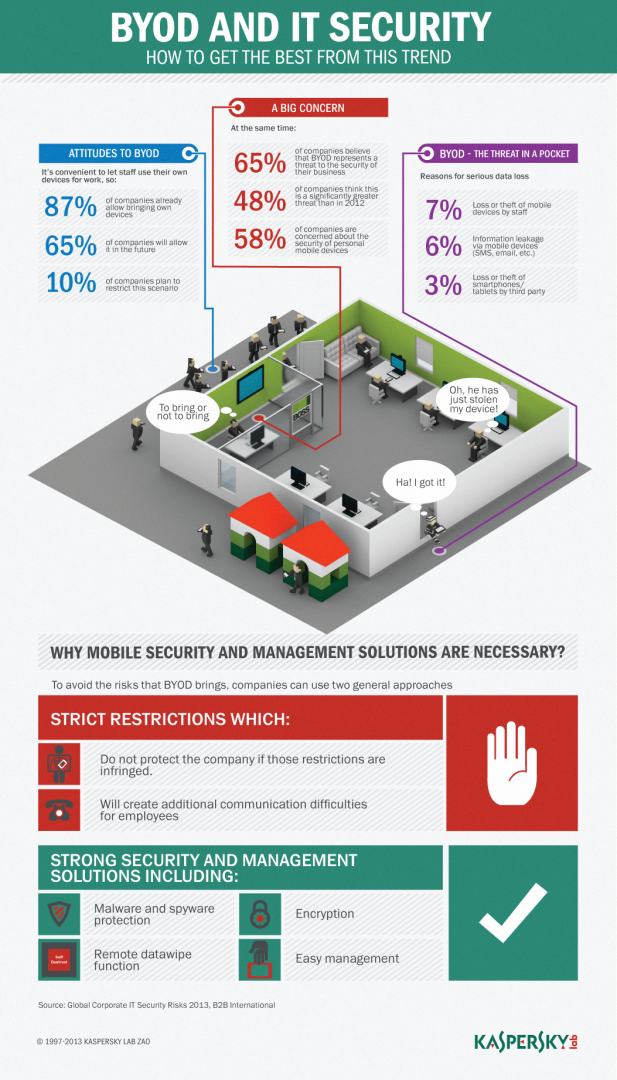For many small businesses, bring your own device (BYOD) is one area of policy, that is not placed high enough on the agenda. Some small business owners think the idea of allowing employees to use personal mobile devices especially notebook PCs to connect to business networks, will involve high-end costs at some point to manage the process. Not every small business is prepared to finance the latest and greatest smart phone device for every single employee. Constrained budgets will always be offered up as to reason for limited IT spend. With proper education and planning startup founders and small business owners, should still be able to leverage the latest technologies to take the business forward. After all the majority of company workers already possess smart phone devices.
It makes sense to allow employees to integrate and leverage mobile devices they might otherwise leave at home. If small companies can get bring your own device right, the dividends could be huge for the small company. For an example usage of personal devices such as Smartphones are actually being a useful tool for fostering staff flexibility, and loyalty. BYOD has the capacity to help small business save money and do more with less. Consumerisation of IT allows small businesses to take advantage of the latest technologies and all the capabilities that come with that without having to invest in the latest hardware.
According to research from Information technology intelligence consulting, (ITIC) approximately 2/3 of businesses accounted for 62% have started to allow end-users to bring their own devices use them as corporate desktops. 71% of businesses however in the research have no specific policies or procedures to support BYOD. These statistics are met with mixed reviews, some IT specialists are proactive and embrace the challenges involved, while others would most likely view this as a potential disaster waiting to happen especially from a security point of view. Security concerns are valid especially when you consider the implications of confidential information leaking out of the company. Many SMEs and small business IT teams however are technically able to implement the best environments and infrastructure to support extra devices, while understanding the impact of extra apps and extra devices on the company network.
They will need to consider that company staff will not always be aware of what information held on their devices, is actually sensitive. This is where the biggest risk lies. Imagine the stress is start-up would face if suddenly financial details, strategic plans and customer databases have now been lost and difficult to retrieve. The best way to deal with these issues is to ensure that staff members are fully aware and informed of the various controls that IT have put in place and what is expected of them outside of the workplace when using their devices. The trend is not going to go away and the savings for implementing a bring your own device environment is significant for smaller firms to not take advantage.
Small business owners need to accept this reality, your IT guy may have just got their head around company security, but the world has since changed literally overnight and tablets and mobile devices are now available for small business usage. Your small business is going to have to get its head around that as well.

Hayden Richards is Contributor of IntelligentHQ. He specialises in finance, trading, investment, and technology, with expertise in both buy-side, sell-side. Contributing and advising various global corporations, Hayden is a thought leader, researching on global regulatory subjects, digital, social media strategies and new trends for Businesses, Capital Markets and Financial Services.
Aside from the articles, interviews and content he writes for IntelligentHQ, Hayden is also a content curator for capital markets, analytic platforms and business industry emerging trends. An avid new media explorer Hayden is driven by a passion for business development, innovation, social business, Tech Trading, payments and eCommerce. A native Trinidadian, Hayden is also a veteran, having served with the Royal Air Force Reserves for the past 10 years.
Follow Hayden on Twitter @HaydenARichards, linkedin.com/haydenhrichards and http://www.scoop.it/u/hayden-richards



























